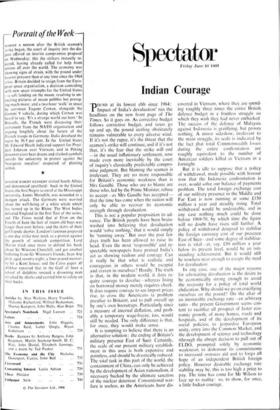Indian Courage
OUND at its lowest ebb since 1964: Impact of India's devaluation' ran the headlines on the new front page of The Times. So it goes on. As corrective budget follows corrective budget, and taxes go up and up, the pound sterling obstinately remains vulnerable to every adverse wind. If it's not the rupee, it's the threat that the seamen's strike will continue; and if it's not that, it's the fear that the strike will end —in the usual inflationary settlement, now made even more inevitable by the court of inquiry's classically predictable compro- mise judgment. But blaming the seamen is irrelevant. They are no more responsible for Britain's economic weakness than is Mrs Gandhi. Those who are to blame are those who, led by the Prime Minister, refuse to accept—as Mrs Gandhi has accepted— that the time has come when the nation will only be able to recover its economic strength through devaluation.
This is not a popular proposition to ad- vance. The British people have been brain- washed into believing that devaluation would 'solve nothing,' that it would simply be 'running away.' But over the past few days truth has been allowed to raise its head. Even the most 'responsible' and re- spectable newspapers have praised India's act as showing realism and courage. Can it really be that what is realistic and courageous in others would be escapist and craven in ourselves? Hardly. The truth is that, in the modern world. it does re- quire courage to devalue—whereas living on borrowed money merely requires cheek. It does require courage to see import prices rise, to cross the Americans (a problem peculiar to Britain), and to pull oneself up by one's own bootstraps. Particularly since a measure of internal deflation, and prob- ably a temporary wage-freeze, too, would still be needed. The only difference is that, for once, they would make sense.
It is tempting to believe that there is an alternative solution: the ending of Britain's military presence East of Suez. Certainly, the scale of our present military establish- ment in this area is both expensive and pointless, and should be drastically reduced. The vital task in this part of the world, the containment of China, can only be achieved by the development of Asian nationalism, if necessary backed by the ultimate sanction of the nuclear deterrent. Conventional war- fare is useless, as the Americans have dis- covered in Vietnam. where they are spend- ing roughly three times the entire British defence budget in a fruitless struggle on which they wish they had never embarked. The success of the defence of Malaysia against Indonesia is gratifying, but proves nothing. A minor sideshow, irrelevant to the main struggle, its scale is indicated by the fact Jhat total Commonwealth losses during the entire confrontation are roughly equivalent to the number of American soldiers killed in Vietnam in a fortnight.
But it is idle to suppose that a policy of withdrawal, made possible with honour now that the Indonesia confrontation is over, would solve our balance of payments problem. The total foreign exchange cost of our military presence in the Middle and Far East is now running at some £150 million a year and steadily rising. Total withdrawal would be undesirable. and in any case nothing much could be done before 1969-70, by which time the figure will no doubt have risen still further. A policy of withdrawal designed to stabilise the foreign currency cost of our presence East of Suez—and some degree of stabilisa- tion is vital—at, say. £50 million a year below its present level, would be an out- standing achievement. But it would still be nowhere near enough to escape the need for devaluation.
In any case, one of the major reasons for advocating devaluation is the desire to be economically strong enough to avoid the necessity for a policy of total world abdication. Why should we go on crucifying ourselves on the pound? On the altar of an immutable exchange rate—an arbitrary ratio—the present Government seems con- tent to sacrifice all prospect of faster eco- nomic growth. of more homes, roads and hospitals, and of the development of its social policies; to jeopardise European unity, entry into the Common Market, and the development of science and technology (through the abrupt decision to pull out of ELDO, prompted solely by economic weakness); to dishonour its commitments to increased overseas aid and to forgo alt hope of an independent British foreign policy. However desirable exchange rate stability may be, this is too high a price to pay. The time has come for Mr Wilson to face up to reality : so, to show, for once, a little Indian courage.


































 Previous page
Previous page